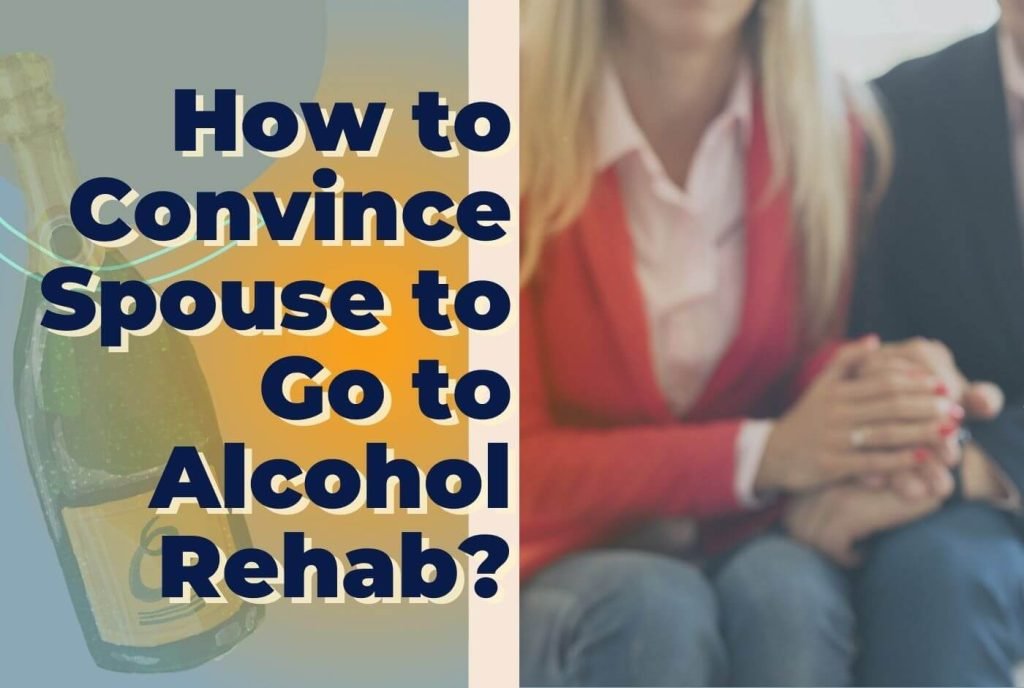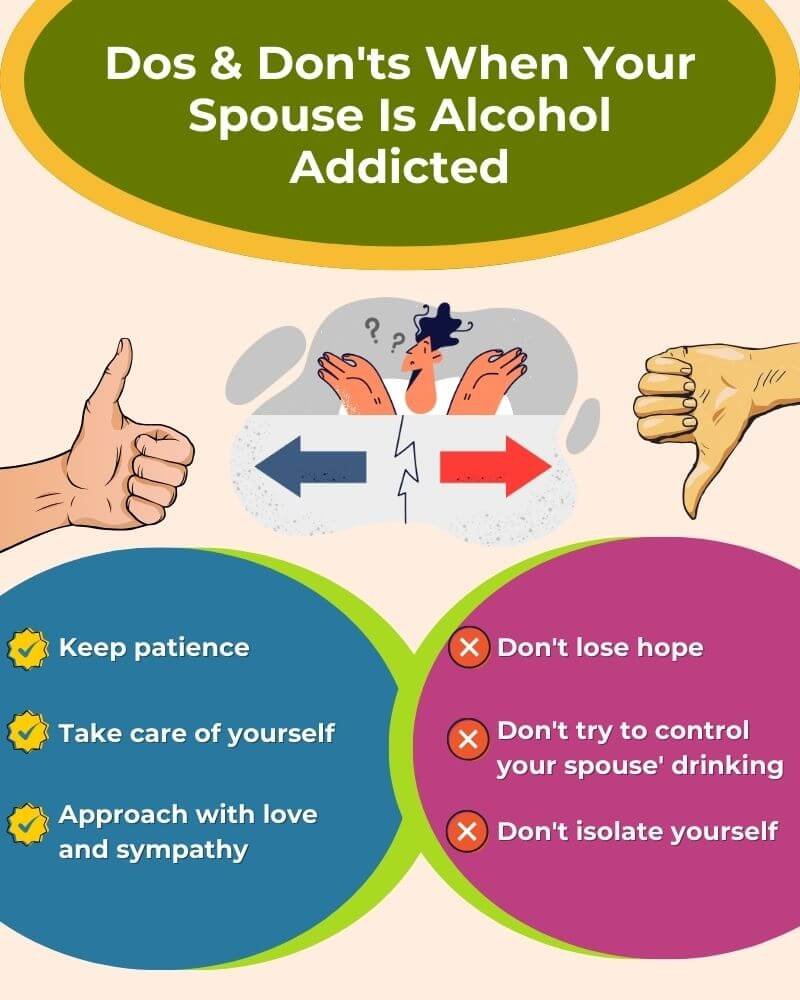If your spouse is alcohol addicted, you might find your relationship to be at its worst. Addiction can alter the brain, and this can eventually make the condition more critical for the addicted to fight back.
But with solid support, love and care, you can help your loved one get out of the addiction. This needs strategic approaches and a long-term support system to convince someone to go to rehab.

According to The New York Times,
“In 2022, 700 overdoses were reversed at New York’s OnPoint overdose prevention centers, and trained staff members were able to get some people to enter treatment.”
So, yes, there’s hope, and you must know the tactics to convince your spouse. I’ll share those strategies, tips, and tricks to help your spouse and the relationship.
What To Do If Spouse Is Alcohol Addicted?
Unfortunately, if you find your spouse alcohol addicted, first of all, having patience is the foremost thing to do. Besides, you need to step with full of empathy and care. However, the following table might come in handy.

How Do I Convince Spouse to Go to Alcohol Rehab?
Well, in the critical tango of love and addiction, the most challenging step might just be convincing your spouse to embrace the lifesaving rhythm of rehab. But keeping patience and faith, it is possible.
I know the pain of dealing with a person with substance use disorder as I helped my best friend recover from alcohol addiction. So, I am sharing some tips here to convince your loved one to go to rehab. First, it is important to educate yourself about the nature of addiction and how to help a person with alcohol addiction. It is crucial to understand that addiction is a complex disease and that your loved one cannot simply stop using on their own. It is also important to approach the conversation with empathy and understanding, and to avoid placing blame or making them feel guilty. It may be helpful to offer your support in finding a treatment program and attending meetings or therapy sessions with them.
Measure the Severity of Addiction
At first, talk to your spouse and try to observe how severe the addiction is. Depending on the acuteness, you need to act and step ahead. Any act of mistake can lead to a severe impact on the addicted one.
Choose the right time and place to talk. Don’t try to have this conversation when your spouse is drunk or in a public place. Instead, find a time when you can both talk calmly and privately.
Act As Soon As Possible
It’s essential to act immediately after knowing about your spouse’s addiction. The more you delay treatment, the more severe the condition can become.
Dealing with an addict spouse is not so easy. You cannot just go and ask them about their addiction. Help your spouse to reveal their thoughts and challenges with care and trust. Share your worries and emotions openly so your spouse does not hesitate to share.
Consult a Counselor Or a Doctor in Case
Contact a mental health therapist, counselor, or intervention specialist if needed. They can provide expert-level guidance and help facilitate the conversation with your spouse.
Basically, their experience can bring structure and guidance to what can often be an emotionally charged situation. This is what psychotherapist Stan Hyman has shared in the video of healing marriage after addiction by eHow Health.
Build Support System & Intervention
Create a visual representation of how their addiction is impacting your life. If your spouse is resistant to seeking help, consider organizing an intervention.
Gather close friends, family members, or a professional interventionist to express their collective concern and encourage them to seek treatment. Despite forming guilt, it can help a lot to cope with the challenges of living with an alcoholic spouse.
Holistic approaches, in this case, are also beneficial. Besides, there are several support groups where people who have experienced such struggles share their journeys and offer suggestions. Try to keep in touch with them, both you and your spouse.
Attend Therapy with Spouse
While encouraging rehab is crucial, remember that the decision ultimately rests with your spouse. Avoid giving ultimatums that may push them away. Respect their autonomy and readiness to seek treatment. Instead, support your spouse in making the decision that is best for them and their health. Offer resources and information about alcohol rehab for dementia patients, and encourage them to speak with a healthcare professional about the potential benefits of treatment. Remember, approaching the subject with empathy and understanding will be more effective in guiding your spouse towards getting the help they need.
Explain that addiction is a medical condition that requires professional treatment, just like any other illness. Emphasize that you’re not asking them to change alone but to embark on this journey together, supporting each other every step.
Encourage Self-care
Prioritize your well-being, of course. To cope with the emotional weight and stress you must endure, you must keep patience and take proper care of yourself.
Don’t lose hope. Do you know that one of the most well-known rappers, Eminem, was also alcohol-addicted once? And it seemed nearly impossible to recover and come back to the industry. But he did after a couple of therapy programs, meditation, and yoga, and he is enjoying his 15 years of sobriety journey.
So, you need to motivate your spouse by sharing success stories as well as making yourself think positively always.
What to Do When Spouse Refuses to Go to Alcohol Rehab
Obviously, you might fail in convincing your addicted spouse to go to rehab. But you need to be more careful in this case.
When your loved one refuses to seek help, it can feel like your relationship is no longer working, but at the same time, you have to understand that the pull of addiction is too strong to create room for thinking of coming back.
However, it’s also important to remember that you’re not alone, and there are other practical and legitimate ways to encourage them towards recovery.
Find out the Why for Refusal
Gently encourage your spouse to explore the underlying reasons for their refusal. What fears, doubts, or past experiences are holding them back? Understanding the ”why” can provide unique insights into their mindset.
Tailor your convincing tactics to find out which one resonates with your spouse. Everyone is different, so be open to adjusting your strategy based on your spouse’s needs and preferences.
Involuntary Commitment
If you find this becoming dangerous to convince, you can take legal help such as involuntary commitment. And this should be used as a last resort.
Hazelden Betty Ford reports that,
“37 states and the District of Columbia have laws in place that allow for the involuntary commitment of individuals with a “substance use disorder,” alcoholism” or both.”
This type of counseling for spouse of addict is legal and safe when the addicted person does not want to get treatment.
However, it is important to note that involuntary commitment is not a cure for addiction. It is simply a legitimate way to get people into treatment so that they can begin to address their addiction.
This treatment for alcohol addiction typically includes a combination of therapy, medication, and support groups. The goal of treatment is to help people achieve and maintain sobriety.
Create Safe Boundaries for Yourself
If your husband or wife is reluctant to seek treatment, you need to keep safe boundaries. Establish clear boundaries to protect your well-being. Make it clear what behavior is acceptable and what is not.
I can remember very well how my aunt decided to separate when my uncle was drug addicted and was not willing to get treatment. And this did not mean she had been separated from you forever. Instead, this made my uncle feel depressed and guilty, which intrigued him to change his mind and get treatment.
Aftercare for Your Spouse
Have you succeeded in dealing with an addict spouse? But this does not put a full stop to your roles. Aftercare steps are crucial for long-term sobriety and maintaining a healthy relationship.
According to NCBI (National Center for Biotechnology Information),
“A review of more than 500 alcoholism outcome studies found that more than 80% of individuals with alcohol addiction relapsed within the first year of treatment.”
There’s nothing to fear as this is very common in alcohol or any other substance use disorder. But holding back into the grip of treatment is the critical point. And as a spouse, you can play an influential role in this case.
When I went to visit my addicted friend in the rehab center, I saw a couple doing behavioral couples therapy (BCT) together. And I find that very impactful in building the chemistry in couples.
Your presence and motivation can help them stick to recovery goals. For this-
- Promote and establish healthy habits and physical activities
- Get motivated by watching success stories and videos.
- Get engaged with supporting groups to continue the recovery process.
- Set goals and milestones for the recovery
- Celebrate short success for encouragement
- Try to rebuild the charm of your relationship that was lost due to addiction.
This Video Might Help in Couples Getting into Rehab
Couples Therapy for Addictions: A Cognitive-Behavioral Approach
Finding oneself married to a drug addict, of course, is not a pleasing matter. However, attention and timely treatment can help in the recovery process.
This journey of convincing your rehab addict husband or wife needs strong determination and faithful love for your spouse. Eventually, you two together can make it happen to live your relationship.
People Also Asked
Can I send my husband to alcohol rehab?
Yes, you can. As a partner, you can even take legal steps to send your husband to rehab in case he denies going. Apart from counseling and family intervention, many states allow involuntary commitment to make the addicted person convinced of treatment.
Can I force my spouse to go to rehab?
No, it would be best if you did not force your spouse to rehab. It might make the situation worse than ever you imagined. Counseling for spouse of addict with care and love is always the best option than forcing him to go to rehab.
Can couples go to rehab together?
Yes. Addicted couples can go to rehab and get treatments together only if they are motivated enough and convinced to build their life together again. AAA (American Addiction Center) encourages this for being an excellent supportive pillar while taking some therapies together.
- What to Pack for 30-Day Rehab? FREE Checklist - May 30, 2024
- Types of Outpatient Rehab: Difference One Should Know - March 28, 2024
- Truth Behind FMLA: Hidden Hurdles of Alcohol Rehab Leave - March 28, 2024